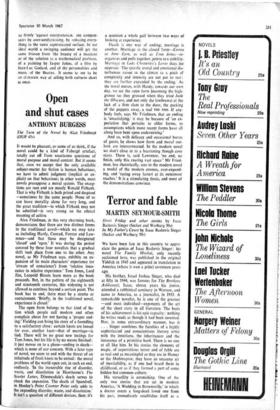The Turn the Novel by Alan Friedman
Open and shut cases
ANTHONY BURGESS
(OUP 45s) It would be pleasant, so some of us think, if the novel could be a kind of Faberge artefact, totally cut off from wearisome questions of moral purpose and moral content. But it seems that, once we accept that the only available subject-matter for fiction is human behaviour, we have to admit judgment (implicit or ex- plicit) on that behaviour; in other words, most novels presuppose a moral system. The excep- tions are rare and are mostly Ronald Firbank.
That is why Firbank is both prized and despised —sometimes by the same people. None of us can leave morality alone for very long, and
the great tradition—to which Firbank may not be admitted—is very strong on the ethical meaning of action.
Alan Friedman, in this very charming book, demonstrates that there are two distinct forms in the traditional novel—which we may take as including Hardy, Conrad, Forster and Law- rence—and that these may be designated 'closed' and 'open.' It was during the period covered by these four novelists that a gradual shift took place from one to the other. Any novel, as Mr Friedman says, exhibits an ex- pansion of its main characters' experience (or 'stream of conscience') from 'relative inno- cence to relative experience.' Tom Jones, Lord Jim, Leopold Bloom learn more as the book proceeds. But, in the pattern of the eighteenth and nineteenth centuries, this widening is not allowed to continue beyond a certain point. The book has to end, there must be a stretto or containment 'Briefly, in the traditional novel, experience is closed.'
The open form belongs to that kind of fic- tion which people call modern and often complain about for not having a 'proper end- ing.' Fielding can bring his story of a foundling to a satisfactory close: certain knots are loosed for ever, another knot—that of marriage—is tied. There will be no great new testings for Tom Jones, but his life is by no means finished: it just moves on to a phase—ending in death— which is none of our concern. With a later type of novel, we seem to end with the threat of an infinitude of fresh knots to be untied : the moral problems of the world open out, in such an end, endlessly. 'In the inexorable rise of disorder, waste, and dissolution in Hawthorne's The Scarlet Letter, Dimmesdale's death serves to check the expansion. The death of Spandrell, in Huxley's Point Counter Point only adds to the expanding disorder, waste, and dissolution.' It isn't a question of different devices, then; it's a question a whole gulf between two ways of looking at experience.
Death is one way of ending; marriage is another. Marriage in the closed form—Emma or Jane Eyre, as ■k ell as Toni Jones—re- oraanies and pulls together, points to a stability. Marriage in Lady Chotterley's Lover does the opposite. The specific moral and emotional dis- turbances raised in the climax to a pitch of complexity and intensity are not put to rest: they are further expanded by the ending: As the novel moves, with Hardy, towards our own day. we see the open form becoming the high- grouse ias they groused when they tried Jude the Obscure, and not only the lowbrows) at the lack of a firm slam to the door, the packing of the puppets away, a real THE END. If any- body feels, says Mr Friedman, that an ending is 'unsatisfying,' it may be because of 'an ex- pectation that pertains to older forms, to assumptions which more recent forms have all along been bent upon undermining.'
And so, with delicacy and occasional bursts of gusto, he shows how form and moral out- look are interconnected. In the modern novel we don't close in to a heartening though cosy stasis. There is, said Lawrence, 'no end, no finish, only this roaring vast space' Mr Fried- man, less rhetorically, sees in the modern novel a model of the modern cosmos, ever-expand- ing, and 'racing away fastest at its outermost reaches.' It is a stimulating thesis, and most of the demonstrations convince.






























 Previous page
Previous page